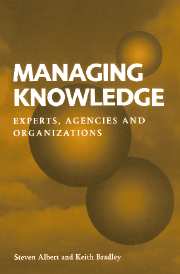Book contents
- Frontmatter
- Contents
- List of figures
- List of tables
- Introduction: the supply-side in context
- Part 1 Expert employees and their new organization
- Part 2 The labour market and the expert employee
- 7 AT&T's special employment policies for expert employees
- 8 An external temporary agency and expert employees
- 9 The Hollywood agency system
- 10 The Internet as an agent
- 11 Labour market segments re-examined
- 12 Agents and intellectual capital
- Appendix A Formal exposition of Winston model
- Appendix B Agency employment and search costs
- Notes
- References
- Index
10 - The Internet as an agent
Published online by Cambridge University Press: 23 November 2009
- Frontmatter
- Contents
- List of figures
- List of tables
- Introduction: the supply-side in context
- Part 1 Expert employees and their new organization
- Part 2 The labour market and the expert employee
- 7 AT&T's special employment policies for expert employees
- 8 An external temporary agency and expert employees
- 9 The Hollywood agency system
- 10 The Internet as an agent
- 11 Labour market segments re-examined
- 12 Agents and intellectual capital
- Appendix A Formal exposition of Winston model
- Appendix B Agency employment and search costs
- Notes
- References
- Index
Summary
The foremost bird in a v-shaped flock is the one in charge … [This is] not so. The orderly formation is the result of a highly responsive collection of processors behaving individually and following simple harmonious rules without a conductor.
Nicholas Negroponte, Being DigitalIntroduction
In the Hollywood film industry agents have become increasingly powerful, especially in recent years. This is because of their knowledge, networks and abilities to combine expertise. Evidence discussed in previous chapters suggests that similar potential exists for agents to grow in other spheres and industries. In the past, agencies have tended to operate most effectively in either concentrated geographic areas, such as Hollywood or London, or when dealing with a relatively small number of individuals who share similar expertise such as sport, music or management. More recently, however, advances in technology, especially the combination of telecommunications and computing, has brought a new powerful dimension to bear on agencies and their potential.
In the mid-1980s it was generally thought that the combination of electronic systems with modern computers would promote the control of more complex systems, in a more complex way, from a smaller number of centres. This forecast of the concentration of power failed to foresee the influence of personal computers and the development of the Internet which began life in 1969 as a Pentagon-sponsored initiative called the Advanced Research Projects Agency. This was a relatively loose confederation of interconnected computer networks which used leased telephone lines to enable people working on military contracts throughout the US to share large data sets and expensive computers.
- Type
- Chapter
- Information
- Managing KnowledgeExperts, Agencies and Organisations, pp. 144 - 151Publisher: Cambridge University PressPrint publication year: 1997



